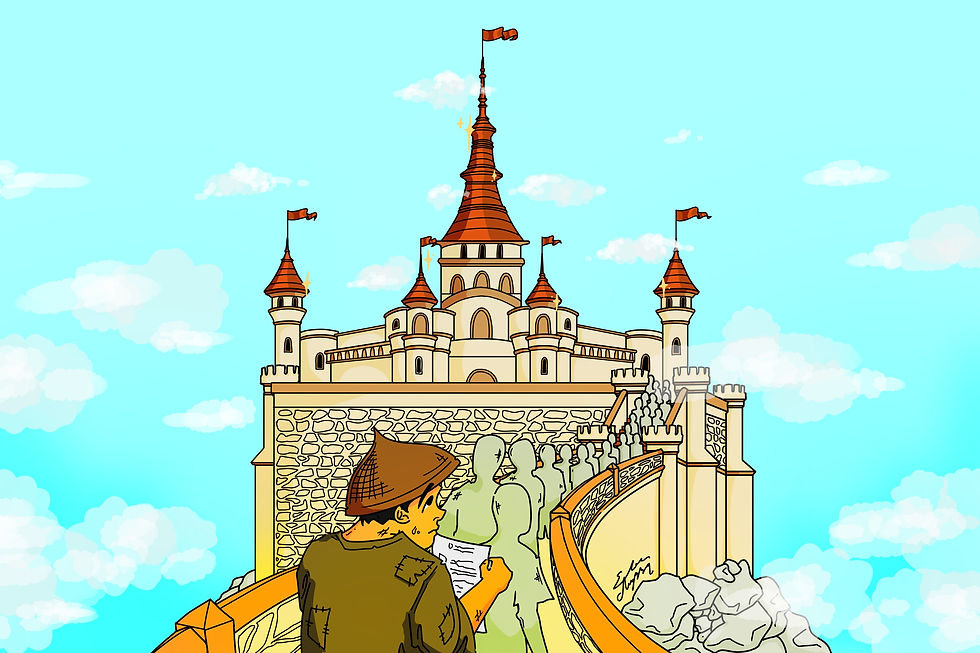The Castle
- The Communicator
- Aug 26, 2025
- 3 min read
By the time Sisyphus arrived at the castle, the afternoon sun pressed on his shoulders like an old debt, not so heavy that it crushed him, but enough to remind him it would be there again tomorrow. The white walls of the castle blazed in the light, their towers capped with gold so bright it stung the eyes. Music drifted faintly from somewhere high above, mingled with the scent of roasted meat and sweet fruit. From the balconies, laughter rose and broke like waves, only to vanish behind closed drapes of silk.

At the gate, the guard asked for his purpose. Sisyphus said he had come for the rights that should have been his without question. The guard nodded as if this made perfect sense, then told him to fall in line behind the thousand other unheard voices waiting to be called.
He took his place beneath the shade of the gate’s crumbling arch, where the cracks in the stone matched the cracks in the road that led there. Men, women, and even a few children clutching folders thicker than their arms waited with him. Some had been there for days. Others had been coming for years. No one spoke of leaving. They only shifted the weight of the papers they carried, as though they had chosen these burdens themselves.
When the gates opened at last, they filed in. The castle’s grandeur expanded around them. The ceilings are painted with battles no one remembers. The polished marble floors showed their reflections, which seemed to walk ahead of them. The chandeliers are glittering like constellations in a sky they would never touch. Yet the deeper they went, the more the shine faded.
The corridors wound like the sides of a hill, their air thick with the scent of paper and sweat. Behind glass windows, clerks shuffled stacks from one pile to another, the piles neither growing nor shrinking. On every wall hung a portrait of the King, each photo nearly identical except for the slogan beneath: "Sama-sama tayong babangon muli," "Tapang at Malasakit," "Pilipino muna!"
Sisyphus approached Window 7. The clerk told him he needed Form 14-B, obtainable only at Window 3. At Window 3, the man there refused, saying it required a clearance slip from the barangay. But Sisyphus had come because the barangay said the castle must issue the clearance. The man nodded, as if pleased to complete the circle, and sent him to the Verification Desk, which was not a desk at all, but a plastic chair in the far corner, occupied by a clerk perpetually on lunch.
The day rolled downward like a stone slipping from his grasp. He chased it from corridor to corridor, each turn bringing him no closer to the summit, though each clerk assured him he was almost there. Sometimes they disagreed on the route, but never on the need to keep pushing. It was a drama they all knew by heart, a play without an ending, where every act began the same way.
Sisyphus is at the bottom of the hill, holding the same weight, ready to climb again.
By closing time, he emerged empty-handed. The weight of his papers felt heavier now, pressed down by the day’s repetition. Others streamed out too, smiling faintly, already speaking of coming back tomorrow. No one asked whether the castle would ever grant what they sought. That question did not belong in the script.
Sisyphus knew the truth. The stone was not the papers, nor the request, nor the hill of corridors. The stone was the need to believe the climb mattered. The castle knew this. It was built on it. And Sisyphus—like the Filipinos—would return tomorrow.
Article: Dulce Amor Rodriguez
Illustration: Alyzza Marie Sales



Comments